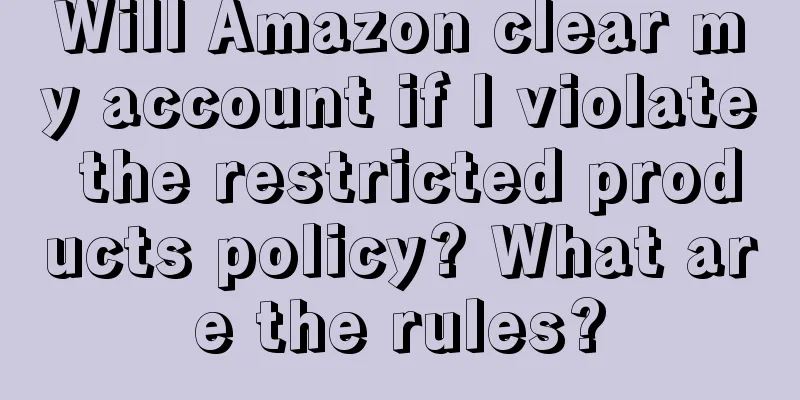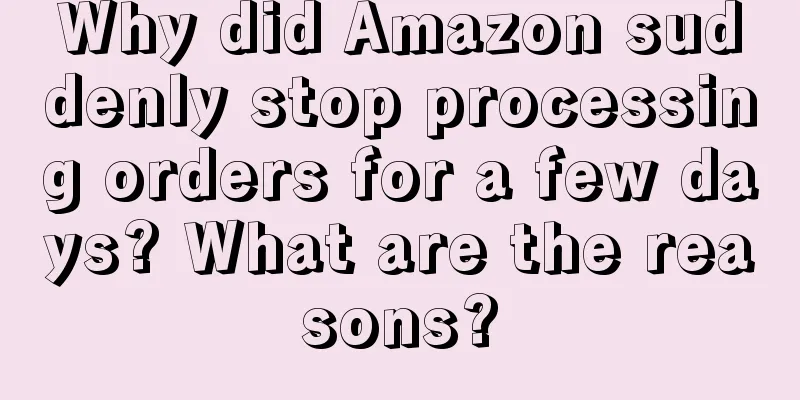Will Amazon clear my account if I violate the restricted products policy? What are the rules?

|
On Amazon, everyone generally needs to abide by the rules. If you don't abide by the rules, there may be corresponding penalties and impacts on your store. Will Amazon clear your store if it violates the restricted product policy? 1. Will Amazon clear my account if it violates the restricted products policy? According to Amazon policy, the seller's violation record will remain in the account for 180 days, and will automatically disappear from your account status page after 180 days. However, this record will not affect the seller's account status and performance, nor will it affect your normal sales. 2. What are the scoring and deduction rules? 1. All new sellers have an initial score of 200 points. Sellers will receive an additional 4 points for every 200 orders they successfully complete in the past 180 days. 2. Each time a seller is found to have a new policy violation, points will be deducted from the account health rating score, and the deducted points will be restored when the seller successfully resolves the violation. The score of each violation depends on the severity, usually 2 to 8 points, but serious violations will automatically reset the seller's account health rating score to zero. In addition, if a seller violates the same policy multiple times, in some cases, repeated violations will double the points. 3. Once a seller’s account is deactivated for falling below the lower limit of the account status rating score (99 points), they need to resolve the violations on the account status page. They can appeal against these violations or file a dispute. If the appeal or dispute is successful, Amazon will withdraw the order. 4. Amazon account rating is a color-coded numerical score between 0 and 1,000. There are three colors corresponding to different score values. "Green" ("Healthy"), with a score of 200-1,000, means that the seller's account is not at risk of being deactivated according to the policy involving that score. 5. If the seller's account health rating is "yellow" ("at risk") and the score is 100-199, it means that the seller's account is at risk of being deactivated. If the seller's account health rating is "red" ("unhealthy") and the score is 99 or lower, it means that the seller's account meets the deactivation requirements or has been deactivated. 6. If the seller's account is in a "risky" or "poor" status, the seller needs to resolve the issues affecting the account status rating score within 7 days, otherwise the seller's account may be deactivated. If Amazon violates the restricted goods policy, it will generally clear the goods directly, and at the same time there will be a restriction on the store’s traffic, so the related impact is very large. Recommended reading: What does Amazon's natural order mean? How to distinguish the advertising order? What to do if Amazon traffic is only in the dozens? How to improve it? What are the traffic entrances of Amazon? Detailed introduction |
<<: How to set up Amazon to not merge warehouses? Why do warehouses need to be split and merged?
Recommend
How to register on gmarket? Process introduction
Gmarket is a Korean shopping website, but we can s...
How to create Amazon image links? What tools are there?
Amazon merchants, you must pay attention to the se...
How to add Amazon variations? What is the method?
When opening a store on Amazon, many people will b...
Is Amazon suitable for personal entrepreneurship? What are the advantages?
Amazon is a cross-border e-commerce platform. Gene...
How to attract 100+ customers every day through short videos? A must-read for local business owners
With the rise of short video platforms, physical m...
Harbin is now the city of wealth
This New Year's Day, the "Little Potatoes...
The must-eat list has "tricked" me again, what's wrong with this world?
For consumers, they used to be able to buy the sho...
Q1 financial report reveals the “wolf nature” of video accounts: user time increased by 80%, and merchants entered the market on a large scale
This article specifically introduces the current s...
How to control Amazon ODR? What are the influencing factors?
Order defect rate (ODR) is an important factor in ...
What are the reasons for Shopee to associate stores? What are the consequences of being associated?
Shopee cross-border e-commerce has been a popular ...
How should maternal and infant e-commerce platforms attract new customers?
As a data analyst, it is very important and valuab...
Meituan’s short drama is launched on Douyin, is the local life war coming to an end?
The competition and cooperation between Meituan an...
Is there a limit on PayPal withdrawals? How is the handling fee charged?
Nowadays, more and more people are trying to do cr...
In the last boom of e-commerce, who is reaping the benefits?
In the cross-border e-commerce boom, how many peop...
How to gain consumer insights? (2023 edition)
This article will share the core methods of unders...









